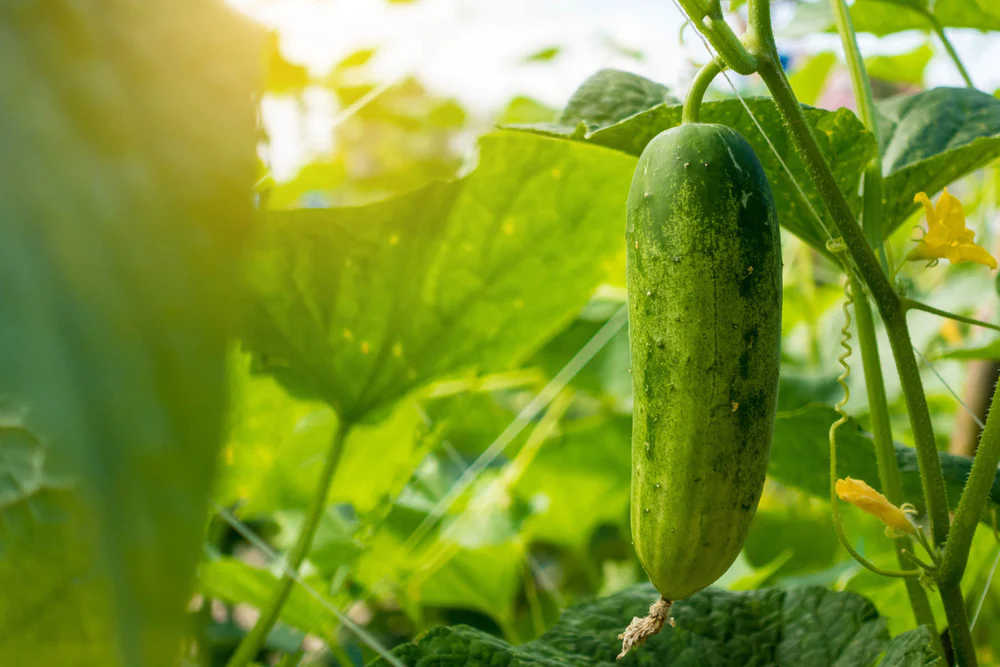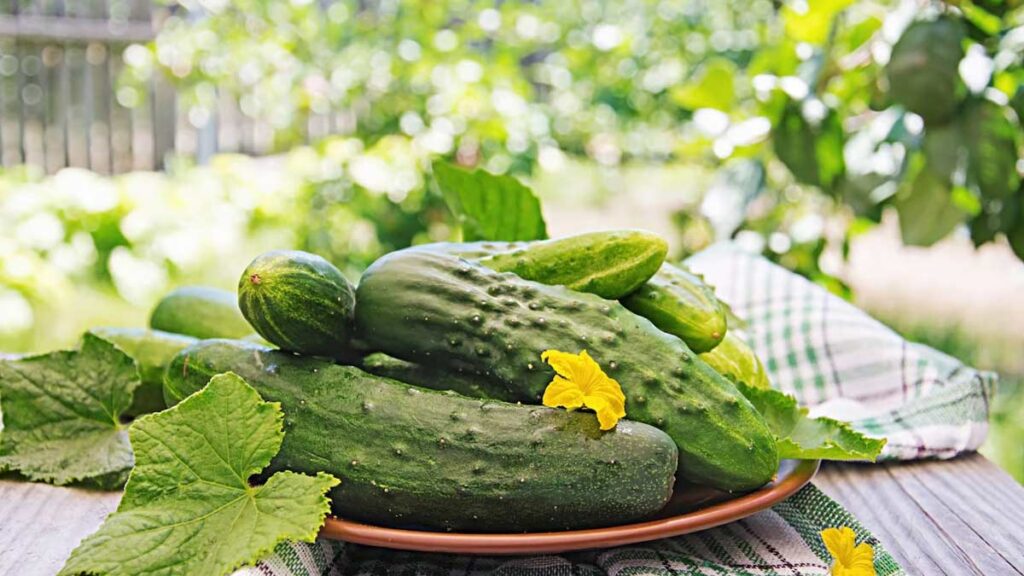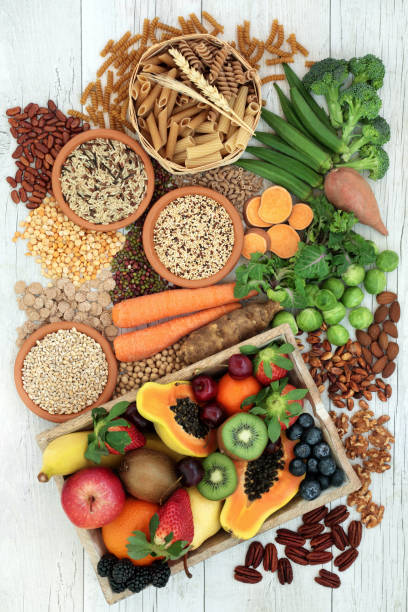Health Benefits of Cucumbers
Did you think cucumbers are just a refreshing salad ingredient or a soothing eye mask? Think again! They are a nutritious and versatile fruit that can offer many health benefits, from hydration to bone strength. In this blog post, we will explore some of the reasons why you should include cucumbers in your diet and how to enjoy them in different ways.
What are cucumbers?

Cucumbers belong to the gourd or Cucurbitaceae family, along with pumpkins, squash and melons. They are technically a fruit, since they have seeds and grow from a flowering plant. So what are the health benefits of cucumbers? First of all, they are low in calories but high in water and several important vitamins and minerals, such as vitamin C, vitamin K, potassium and magnesium. They also contain antioxidants, such as flavonoids and tannins that may help protect your cells from damage caused by free radicals, oxidative stress and inflammation which can lead to chronic pain. For more information on this topic see my post on
Unlocking the Secrets of Glutathione for Enhanced Health.
Vitamin K, Potassium, Magnesium
We all know that vitamin C is recommended to help prevent colds and to treat them if we do catch a cold. But what about Vitamin K, Potassium and Magnesium. What health benefits do these compounds provide?
Vitamin K
Vitamin K is a group of fat-soluble vitamins that have many important functions in the body. Some of the benefits of vitamin K are:
- It helps with blood clotting, which prevents excessive bleeding and promotes wound healing. Vitamin K activates four of the 13 proteins needed for blood clotting .
- It supports bone health, by regulating the amount of calcium in the bones and preventing osteoporosis. Vitamin K helps the body use a protein called osteocalcin, which binds calcium to the bone matrix .
- It may protect against cardiovascular disease, by preventing the buildup of calcium in the arteries and reducing the risk of atherosclerosis and heart attack. Vitamin K also helps lower blood pressure and inflammation .
- It may improve cognitive function, by preventing oxidative stress and inflammation in the brain and enhancing memory and learning. Vitamin K may also protect against Alzheimer’s disease and other neurodegenerative disorders .
Vitamin K can be obtained from different sources, depending on the type. Vitamin K1, or phylloquinone, is mainly found in plant foods like cucumber but especially green leafy vegetables like spinach and kale. Vitamin K2, or menaquinone, is found in some animal products and fermented foods, such as cheese and natto. The body can also produce vitamin K2 from gut bacteria .
The recommended daily intake of vitamin K for adults is 120 micrograms (mcg) for men and 90 mcg for women. Most people can get enough vitamin K from a balanced diet, but some groups may need supplements, such as newborns, people with malabsorption disorders or people taking blood thinners .
Vitamin K is an essential nutrient that has many benefits for your health. By eating a variety of foods rich in vitamin K, you can support your blood clotting, bone health, heart health and cognitive function.

Potassium
Potassium is an essential mineral that plays a key role in maintaining overall health. It helps regulate blood pressure, supports muscle function and aids in proper nerve function. Potassium also plays a role in maintaining fluid balance and electrolyte levels in the body. Consuming foods rich in potassium, such as bananas, sweet potatoes, and spinach can help support heart health and reduce the risk of stroke. It is important to ensure an adequate intake of potassium through a balanced diet to support overall health and well-being.
Magnesium
Magnesium is an essential mineral that plays a crucial role in over 300 biochemical reactions in the body. It is important for muscle and nerve function, blood sugar regulation and bone health. Some of the health benefits of magnesium include reducing the risk of heart disease, improving exercise performance, and relieving symptoms of PMS.
Additionally, magnesium has been shown to help lower blood pressure, reduce inflammation and alleviate migraines. Many people do not get enough magnesium from their diet so it is important to include magnesium-rich foods such as cucumber, leafy greens, nuts, seeds and whole grains in your diet.

How can cucumbers benefit your health?
Here are some of the health benefits of eating cucumbers:
- They increase hydration. Cucumbers are made up of about 96% water, which makes them an ideal food for boosting your hydration levels. Drinking enough water is essential for many bodily functions, such as digestion, joint health, kidney health, brain function and temperature regulation. Eating cucumbers can supplement the water you drink and help you stay hydrated throughout the day. Staying hydrated is important for maintaining overall health and well-being. Water is essential for lubricating joints, aiding in digestion and nutrient absorption. It also helps to flush out toxins and waste products from the body. Dehydration can lead to a range of health issues, including fatigue, headaches, and decreased cognitive function. It is recommended to drink at least 8-10 glasses of water per day to stay properly hydrated. See post on The Importance of Hydration to Overall Health: https://betterhealthbetteryou.com/the-importance-of-hydration-for-overall-health/
- They strengthen bones. Cucumbers are rich in vitamin K, which is a key nutrient for bone health. Vitamin K helps your body absorb calcium, which is the main mineral that builds and maintains strong bones. Getting enough vitamin K can reduce your risk of bone fractures and osteoporosis, a condition that causes bone loss and weakness. Cucumbers also provide some calcium, which works together with vitamin K to support your bone health.
- They promote gut health. The water and fiber in cucumbers can aid your digestion and prevent constipation. Water helps your body break down food and absorb nutrients, while fiber adds bulk to your stool and stimulates bowel movements. Eating cucumbers can also help balance the pH of your stomach and reduce acidity, which may prevent ulcers and gastritis.
- They support weight loss. Cucumbers are low in calories but high in volume, which means they can fill you up without adding too many calories to your diet. They also have a high water content, which can increase your satiety and reduce your appetite. Eating cucumbers can help you control your portions and calorie intake, which can lead to weight loss or maintenance.
- They lower blood sugar. Cucumbers may have a beneficial effect on your blood sugar levels, especially if you have diabetes or prediabetes. Some studies have shown that cucumbers can lower blood glucose and improve insulin sensitivity in people with type 2 diabetes. This may be due to the antioxidants and fiber in cucumbers, which can modulate the activity of enzymes involved in carbohydrate metabolism.
- They prevent chronic diseases. Cucumbers contain various antioxidants that can protect your cells from oxidative stress, a process that generates harmful free radicals that can damage your DNA and cause inflammation. Oxidative stress has been linked to many chronic diseases, such as cancer, heart disease, lung disease and autoimmune disease. Eating cucumbers can help scavenge these free radicals and reduce the risk of these diseases.

How to eat cucumbers?
Cucumbers are very versatile and can be eaten raw or cooked, peeled or unpeeled, sliced or diced, alone or with other foods. Here are some ideas on how to enjoy cucumbers:
- Add them to salads, sandwiches, wraps or burgers for a crunchy texture and a refreshing flavor.
- Make cucumber noodles or ribbons with a spiralizer or a vegetable peeler and use them as a low-carb alternative to pasta or rice.
- Blend them with yogurt, mint, garlic and lemon juice to make tzatziki, a Greek yogurt dip that goes well with pita bread or grilled meat.
- Pickle them with vinegar, sugar, salt and spices to make homemade pickles that can last for weeks in the fridge.
- Juice them with apples, celery, ginger and lemon to make a detoxifying green juice that can boost your energy and immunity.
- Slice them thinly and place them over your eyes for a soothing spa treatment that can reduce puffiness and dark circles.

To get the most out of cucumbers, eat them with the peel whenever possible. The peel contains most of the fiber and some of the nutrients that cucumbers offer. However, make sure to wash them thoroughly before eating or choose organic cucumbers to avoid pesticides.
Conclusion
Cucumbers are a delicious and healthy fruit that can benefit your health in many ways. They can hydrate you, strengthen your bones, promote your gut health, support your weight loss, lower your blood sugar and prevent chronic diseases. They are also easy to eat and prepare in various ways. Try adding more cucumber to your diet! See how they can improve your overall physical health and well-being.
I hope you have enjoyed this content! Did you know all there is to know about this amazing fruit? Will you include more cucumber in your diet? Let us know in the comment section below or, if you have questions, I’d love to hear from you! Finally, if you’d like to be notified when updates are made please enter your name and best email in the form below!

Grant Rayner
Hey Grant,
I was already a big fan of cucumbers, but didn’t realize they were also loaded with so many health benefits. I always assume they were mostly just water and little else. The vitamins and other antioxidants they’re loaded with make them an even more enjoyable snack or salad topping.
I’m curious about pickling – do you know if that process removes some of the health benefits from the cucumber?
Hey Ben! Yes exactly. We tried to grow some this year but it rained all of May and those little seedlings drowned. We always put them in salads but, like you, I had no idea! It’s like they’re a superfood and I didn’t know that until I started doing the research. As for picking, I’m not aware of any study that would suggest that picking removes any of the benefits. I do know that, for most plants, the timing of the harvest is important. I appreciate your comment and hope you’re having a great day!
Cucumbers are definitely more than just a salad staple or an eye mask! Their high water content helps with hydration, while their nutrients like vitamins K and C contribute to bone strength and overall health.
They’re versatile and can be enjoyed in various dishes or infused in water for a refreshing drink. I like to eat as a salad. If we want to live happy healthy life, we need to add more fruits and vegetables in our diet. Thanks for sharing valuable information.
Thank you for your comments and yes absolutely! I have always loved them but I had no idea they came with that much nutrition until I started the research. Hope you’re having a wonderful day!